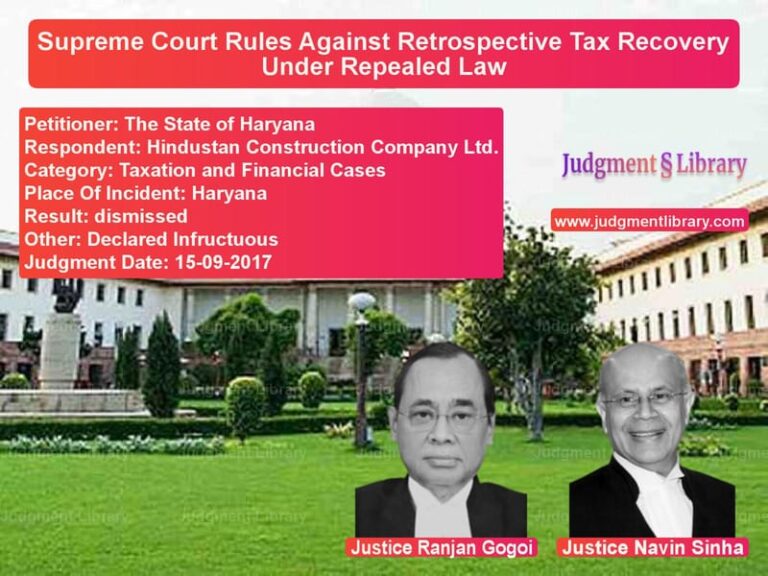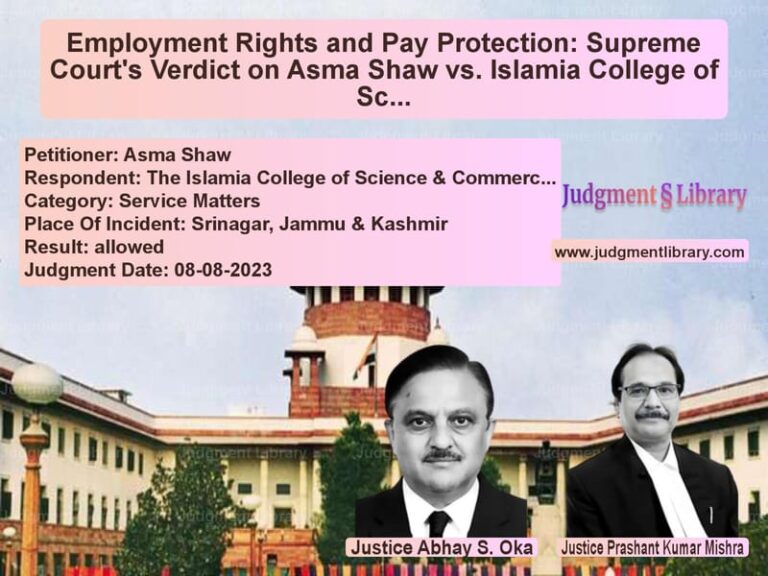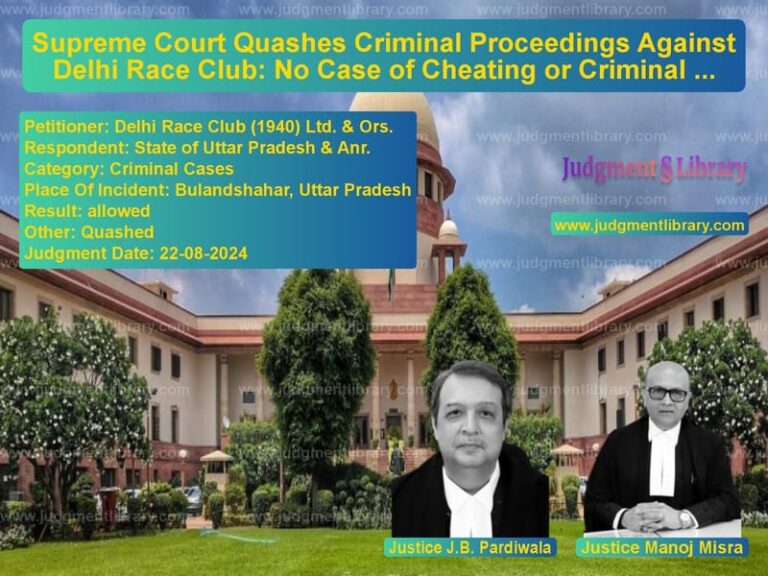Supreme Court Orders Fresh Arbitration in Railway Contract Dispute
The Supreme Court of India, in its judgment dated 18 November 2021, directed fresh arbitration in a long-standing contractual dispute between M/s. Narinder Singh and Sons and the Northern Railway. The case revolved around the termination of a construction contract awarded in 1993 and subsequent arbitration proceedings that were contested by the respondent, Union of India.
Background of the Case
The dispute began in 1993 when M/s. Narinder Singh and Sons was awarded a tender by the Northern Railway for constructing an additional washing line at Jammu Tawi Railway Station. The contract was later terminated on 3 April 1996 due to alleged non-performance by the contractor. The appellant, however, claimed that the termination was wrongful and that the railway authorities had repeatedly changed the scope of work, leading to disputes.
The appellant invoked the arbitration clause, following which the General Manager of Northern Railways appointed an arbitrator. However, the contractor challenged the appointment, seeking an independent arbitrator through the District Court. After several rounds of litigation, the Punjab and Haryana High Court finally appointed Justice A.L. Bahri (Retd.) as the sole arbitrator on 15 February 2010.
Petitioner’s Arguments
The petitioner, M/s. Narinder Singh and Sons, argued:
- The termination of the contract was illegal and in breach of the agreement.
- The respondent repeatedly changed the scope of work, making it impossible to complete the project on time.
- The arbitrator had fairly examined the claims and awarded Rs. 20,25,255 with interest.
- The Punjab and Haryana High Court had wrongly set aside the award on the grounds of procedural irregularities.
Respondent’s Arguments
The respondent, Northern Railway, countered these claims, arguing:
- The arbitrator had conducted the proceedings in a hasty and unfair manner.
- The respondent was not given sufficient opportunity to present its case, violating the principles of natural justice.
- The award included pre-reference and pendente lite interest, which was not permissible under Clause 16(2) of the General Conditions of the Contract.
Supreme Court’s Observations
The Supreme Court bench, comprising M.R. Shah and Sanjiv Khanna, reviewed the proceedings and found that the arbitrator had acted with undue haste. The Court noted:
- The respondent had sought additional time to file its defense, but its request was denied.
- The arbitrator proceeded with an ex parte award without allowing adequate opportunity for cross-examination of key witnesses.
- The principles of natural justice had been violated, justifying the setting aside of the award.
Key Supreme Court Rulings Cited
The Court referred to several important precedents, including:
- Oil & Natural Gas Corporation Ltd. v. Saw Pipes Ltd. (2003) – Establishing the principle that awards violating public policy can be set aside.
- Dyna Technologies Pvt. Ltd. v. Crompton Greaves Ltd. (2019) – Emphasizing that arbitrators must provide fair opportunities to all parties.
- State of Maharashtra v. M/s. Hindustan Construction Company Ltd. (2010) – Clarifying the conditions under which courts can intervene in arbitral awards.
Final Judgment
The Supreme Court ruled in favor of a fresh arbitration, issuing the following directives:
- The previous arbitral award dated 27 November 2010 was set aside due to procedural irregularities.
- Justice S.N. Aggarwal (Retd.) of the Punjab and Haryana High Court was appointed as the new arbitrator.
- The parties were directed to bear the arbitration costs equally.
- The fresh arbitration would continue from the stage of cross-examination, allowing the respondent to present its defense.
- The issue of pre-reference and pendente lite interest would be reconsidered in the new arbitration.
Implications of the Judgment
The Supreme Court’s ruling has significant implications for arbitration proceedings in India:
- Reinforcement of Natural Justice: The judgment ensures that arbitration proceedings must allow fair participation by all parties.
- Judicial Oversight in Arbitration: The ruling clarifies that courts can intervene if an arbitrator fails to follow due process.
- Protection Against Arbitrary Awards: Awards issued without giving parties a fair chance to present their case can be set aside.
- Setting Precedent for Future Arbitration Cases: The case will guide future disputes where procedural fairness is questioned.
The Supreme Court’s judgment in M/s. Narinder Singh and Sons vs. Union of India reinforces the importance of procedural fairness in arbitration, ensuring that both parties get an equal opportunity to be heard.
Petitioner Name: M/s. Narinder Singh and Sons.Respondent Name: Union of India Through Divisional Superintendent Engineer – II, Northern Railway, Ferozepur Division.Judgment By: Justice M.R. Shah, Justice Sanjiv Khanna.Place Of Incident: Jammu Tawi Railway Station.Judgment Date: 18-11-2021.
Don’t miss out on the full details! Download the complete judgment in PDF format below and gain valuable insights instantly!
Download Judgment: ms.-narinder-singh-vs-union-of-india-throu-supreme-court-of-india-judgment-dated-18-11-2021.pdf
Directly Download Judgment: Directly download this Judgment
See all petitions in Arbitration Awards
See all petitions in Enforcement of Awards
See all petitions in Dispute Resolution Mechanisms
See all petitions in Judgment by Mukeshkumar Rasikbhai Shah
See all petitions in Judgment by Sanjiv Khanna
See all petitions in partially allowed
See all petitions in Remanded
See all petitions in supreme court of India judgments November 2021
See all petitions in 2021 judgments
See all posts in Arbitration and Alternate Dispute Resolution Category
See all allowed petitions in Arbitration and Alternate Dispute Resolution Category
See all Dismissed petitions in Arbitration and Alternate Dispute Resolution Category
See all partially allowed petitions in Arbitration and Alternate Dispute Resolution Category







